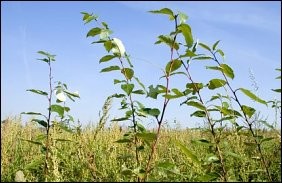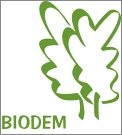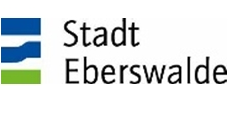BIODEM ŌĆö Trial and demonstration plots for the cultivation of fast-growing tree species in short-rotation coppice
In spring 2006 the research project BIODEM established 14 trial and demonstration plots for the cultivation of fast-growing tree species in short-rotation coppice on different sites in the federal state of Brandenburg. Within the project questions of growth and yield, ecology and economy in relation to the cultivation of energy wood in Brandenburg are under investigation.
Work steps of the project include:
Selection of experimental plots
Reproduction of planting material
Analysis of legal and political funding constraints
Lay out and management of experimental plots by farmers
Modeling growth and yield of wooden biomass and development of a module for the conversion of biomass in bio-energy

The trial and demonstration plots differ mainly in ground water availability and soil quality. Local climatic conditions are taken into account, through the spatial distribution of plots in different regions of Brandenburg.
The plots are located on sites used formerly for agricultural purposes and on one field irrigated with sewage, respectively. The tree species used are Willow (Salix spec.), Poplar (Populus spec.), Black Locust (Robinia pseudoacacia), Maple Ash (Acer negundo), Grey Alder (Alnus incana), and Ailanthus (Ailanthus altissima). Depending on the investigation site 29 to 35 varieties or cultivars, respectively, are planted or stuck into the ground (see Table 1).
Table 1: Planted varieties of willow and poplar | |
Species | Variety |
Poplar | Max 1, Max 3, Max 4, Androscogin, AF 2, Monviso, NE 42 [alias H 275], Muhle - Larsen, Weser 6 |
Willow | Tora, Tordis, Inger, Sven 1013, 1023, 1033, 1047, 1053, 1054, 1056, 1156, Sprint, Start , Turbo Klon S 178 = 'Hartsool' |
Phase I of the project covers the time between the establishment of trial plots and the first harvest for cutting back in a 3-year rotation cycle. At the time of harvest destructive measurements of growth and yield are carried out for the first time. Currently, scientific accompanying research is carried out. Besides the evaluation of primary growth success of the planted species and varieties, site specific parameters are measured, as well.
On 4 plots pedological-meteorological measuring stations have been set up. Thus, it is possible to continuously gather information about parameters like precipitation, global radiation or soil moisture.
In September 2006 an inventory of primary growth success has been carried out. The results emphasize that the extreme drought in that summer has lead to enormous losses, mainly on dry-sandy sites and especially for poplar plants. Therefore some plots have been planted anew in 2007.
Contact:
HNE Eberswalde. Hochschule f├╝r nachhaltige Entwicklung Eberswalde (FH)
University of Applied Sciences
Alfred-M├Čller Str. 1
16225 Eberswalde
Prof. Dr. Dieter Murach
Project Leader
Tel: +49 (0) 3334 / 65418
M. Sc. Rainer Schlepphorst
Project Coordinator
Tel: +49 (0) 3334 / 65596
Website: www.biodem.de











